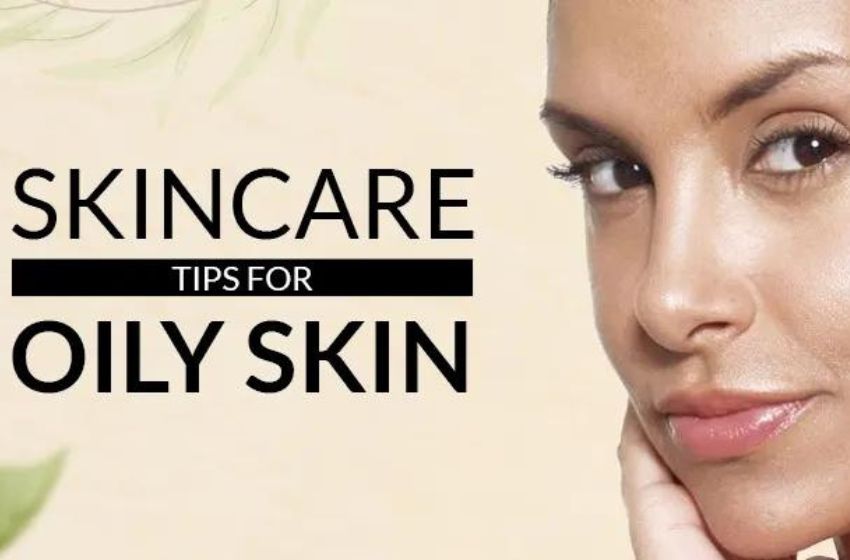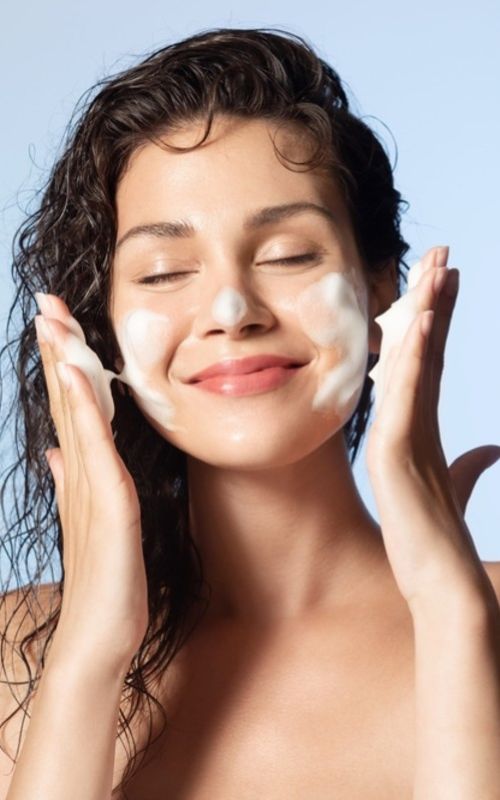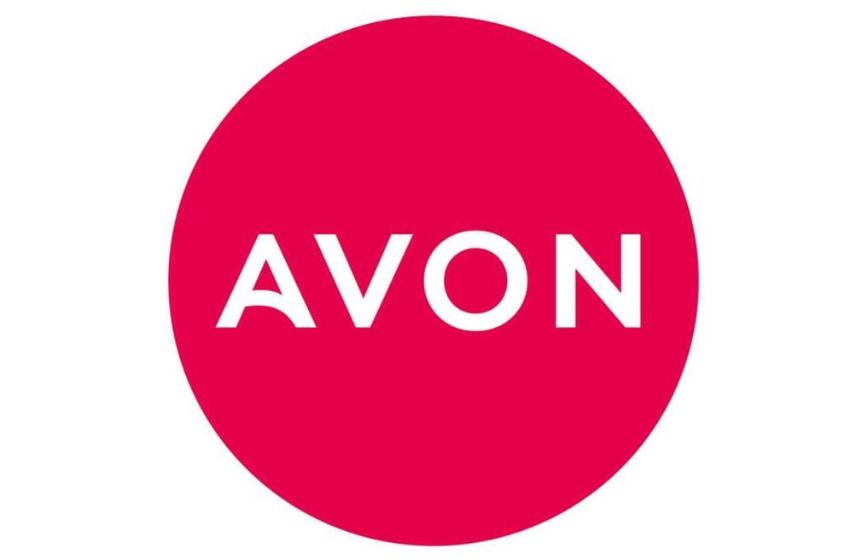
Are you tired of battling the relentless shine and constant breakouts that come with oily skin? Well, say goodbye to your skincare woes because we have some game-changing tips just for you! In this blog post, we will reveal five powerful skincare secrets that will banish acne and transform your complexion. So get ready to bid farewell to oily skin once and for all – it’s time for a radiant, clear, and confident new you!

Introduction to oily skin and its causes
Oily skin is a common skin type that affects millions of individuals worldwide. It is characterized by an excessive production of natural oils, also known as sebum, by the sebaceous glands in the skin. This overproduction of oil can leave the skin with a shiny or greasy appearance and make it more prone to acne breakouts.
Inheriting larger sebaceous glands means your body will produce more oil than others. Unfortunately, this is something that cannot be changed but can be managed through proper skincare routines.
Hormonal imbalances can also contribute to excess oil production in the skin. Androgens are hormones that stimulate the sebaceous glands to produce oil and when there is an increase in their levels (such as during puberty or menstruation), it can lead to oily skin.
Tip #1: Cleanse with oil-free products
For many individuals with oily skin, the thought of using any type of oil on their face can be intimidating. However, using oil-free products for cleansing is actually a crucial step in managing and improving oily skin. Here's why:
1. Oil attracts oil: It may seem counterintuitive, but using an oil-based cleanser can actually help balance out the natural oils on your face. This is because "like dissolves like" - meaning that the oil in the cleanser will attract and dissolve excess sebum (the natural oils produced by your skin) without stripping away too much moisture.
2. Avoid clogging pores: If you have acne-prone skin, it's important to avoid any ingredients that could potentially clog your pores. Oil-free cleansers typically do not contain heavy oils or comedogenic (pore-clogging) ingredients, making them a safer option for those with oily and acne-prone skin.
3. Gentle yet effective: Often times, individuals with oily skin tend to over-cleanse or use harsh products in an attempt to remove excess oil from their face. However, this can actually backfire and lead to even more oil production as your skin tries to compensate for being stripped of its natural oils. Using an oil-free cleanser allows you to gently cleanse without causing irritation or excessive dryness.
Tip #2: Exfoliate regularly, but gently
One of the most crucial tips for managing oily and acne-prone skin is to exfoliate regularly, but gently. Exfoliation is the process of removing dead skin cells from the surface of the skin, revealing a brighter and smoother complexion. For those with oily skin, regular exfoliation helps to control excess oil production and prevent clogged pores.
However, it is important to note that over-exfoliating can do more harm than good. Harsh or abrasive scrubs can strip away too much of your skin's natural oils, causing it to produce even more oil in an attempt to compensate. This can lead to increased breakouts and irritation on your already sensitive skin.
When choosing an exfoliator for oily and acne-prone skin, look for products that contain gentle chemical exfoliants such as alpha hydroxy acids (AHAs) or beta hydroxy acids (BHAs). These ingredients work by breaking down the bonds between dead skin cells, making them easier to remove without causing damage to your delicate facial tissue.
Tip #3: Hydrate with non-comedogenic moisturizers
When it comes to managing oily skin, many people may think that avoiding any sort of moisturizer is the key. However, this is not true. In fact, skipping out on moisturizers can actually make oily skin worse by causing dehydration and triggering an overproduction of oil.
The key here is to choose the right kind of moisturizer – one that will provide hydration without clogging pores. This brings us to our third tip: hydrating your oily skin with non-comedogenic moisturizers.
Non-comedogenic means a product or ingredient that does not block or clog pores. This is especially important for those with acne-prone skin as clogged pores can lead to breakouts.
By choosing a non-comedogenic moisturizer, you can ensure that your skin receives the necessary hydration without the risk of aggravating your acne-prone skin.
Benefits of using non-comedogenic moisturizers for oily skin:
1. Lightweight formulation: Non-comedogenic moisturizers are typically lightweight in texture, making them perfect for those with oily skin. Heavy creams and oils can sit on top of the skin and contribute to excess oil production.
2. Non-greasy finish: These types of moisturizers absorb quickly into the skin without leaving behind a greasy residue, which is ideal for those with already-oily complexions.
Tip #4: Incorporate targeted treatments for acne control
Having oily skin means having to deal with frequent breakouts and constant battle against acne. While incorporating the right skincare routine and products can definitely help in controlling oiliness, sometimes it is not enough. This is where targeted treatments for acne can make a significant difference.
Targeted treatments are specifically formulated to address different types of acne such as whiteheads, blackheads, pimples, cysts, and nodules. These treatments are usually more potent than regular skincare products and contain active ingredients that target the root cause of acne.
When choosing a targeted treatment for your oily skin, look for ingredients like salicylic acid, benzoyl peroxide, retinoids, sulfur, or tea tree oil. These ingredients work by unclogging pores, reducing inflammation and bacteria on the skin's surface, removing excess oil and dead skin cells, and promoting cell turnover.
One popular type of targeted treatment is spot treatments. These are designed to be applied directly on active breakouts or emerging pimples to speed up the healing process. Spot treatments often come in the form of gels or creams and should be used sparingly only on affected areas.

Tip #5: Protect your skin from the sun
When it comes to oily and acne-prone skin, protecting it from the sun is often overlooked. Many people with this skin type think that because their skin already produces excess oil, they don't need to worry about adding more moisture or protection. However, this couldn't be further from the truth.
Exposure to sunlight can actually aggravate acne and worsen oily skin. The UV rays can trigger inflammation and stimulate the production of sebum (oil) in the skin, leading to clogged pores and breakouts. Additionally, unprotected sun exposure can cause hyperpigmentation and premature aging, making it crucial for those with oily and acne-prone skin to protect their skin from the sun.
So how exactly should you protect your skin from the sun? Here are some tips:
1. Wear sunscreen every day: Sunscreen is a must-have for all individuals, regardless of their skin type. For those with oily and acne-prone skin, look for a lightweight formula that is labeled as non-comedogenic (meaning it won't clog pores) and oil-free. It's recommended to use a broad-spectrum sunscreen with SPF 30 or higher.
2. Reapply throughout the day: Sunscreen should be reapplied every two hours if you're spending prolonged periods in the sun or sweating excessively. This will ensure that your skin stays protected all day long.
Conclusion
Having oily skin and dealing with acne can be frustrating, but with these 5 game-changing skincare tips, you can take control of your situation. By understanding the root causes of excess oil production and implementing a proper skincare routine that includes gentle exfoliation, non-comedogenic products, and hydration, you can say goodbye to oily skin for good. Remember to listen to your body and adjust your routine as needed. With consistency and patience, you will see a noticeable difference in the health and appearance of your skin. Say hello to clear, glowing skin!


